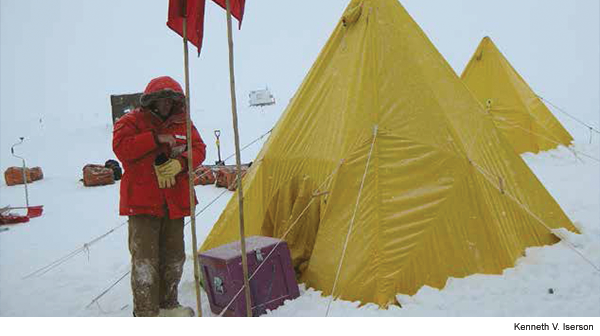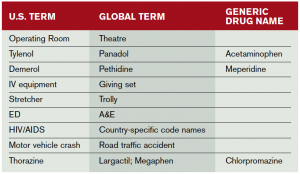

Explore This Issue
ACEP Now: Vol 34 – No 01– January 2015(click for larger image)
Table 1. Commonly Confused Medical Terms (English)
When conversing in a language other than English, the medical terms, especially abbreviations, will vary widely. Many of the following terms are used in countries where English is a common language among health care professionals, even if most of the population does not use it.
Once the patient is medicated, you begin running through the vast array of unusual diseases you have prepared to expect. You run down your list: scrub typhus, typhoid, malaria, dengue, chikungunya, leptospirosis, gastrointestinal tuberculosis, and hepatic parasites. After your physical exam and a bedside ultrasound, you find, as is usually the case, that your patient has a more common disease, appendicitis. Common diseases and injuries may present similarly everywhere in the world. While malaria, tuberculosis, dengue, and HIV are more common in some regions than others, cardiovascular disease, stroke, cancer, and trauma remain the most common causes of death around the world. Those are the ailments that you most often see and need to treat, albeit often with limited or makeshift resources.2
Daily Life and Culture
Of course, outside your clinical environment, you might find life considerably different than at home. On my travels, I have resided in tents (see Figure 2), shipping containers, hospital rooms, dormitories, hotels, houses (in bedrooms and dank basements), industrial buildings (between the noisy equipment), and on ships, both at dock and in rolling seas. Occasionally, I have slept alone. More often, I have had between one and about 250 roommates, many of whom snored loudly enough to “wake the dead.” Bathing and toilet facilities are usually shared and are often of strange design.
Finally, be prepared, especially after prolonged stays in resource-poor environments, to experience reentry culture shock when returning home. Initially, many daily activities that you take for granted will seem superfluous, if not decadent. Many ED patients will appear to have trivial complaints compared to many patients you saw abroad. Your first impulse may be to lecture them about the medical situation around the world. Restrain yourself! They are simply responding to their cultural norms. Reacquaint yourself with them. To help you, read a bit about reentry culture shock and how to prevent it before you initially leave on your trip; ask your loved ones, your boss, and a few colleagues to do the same. Then slowly allow yourself to reacclimate to your society and reflect on your joy and what you learned from your international experience.
Pages: 1 2 3 | Single Page





One Response to “What to Expect at Your Global Health Care Volunteer Destination”
April 28, 2015
EricaTherefore the dental implant, slight discomfort can be relieved with over-the-table pain medicines, for example Tylenol or Motrin.